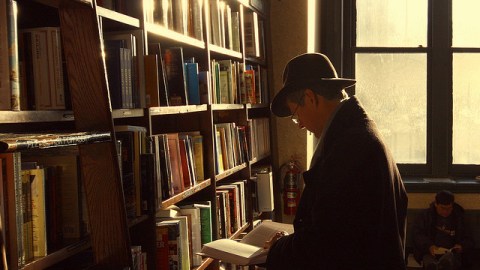“Humanity Over Technology”: The Stucky Plan to Save Bookstores

Bravo to Janaka Stucky, whose new article in Poetry on struggling independent bookstores is both the most sensible and inspiring thing I’ve read on the subject. Stucky concedes what everyone in the industry knows, that a price war with Amazon is one small bookstores cannot win. Reasoning that these stores must therefore fight on different turf, he offers some concrete suggestions: establish a lively Web presence, feature expertly curated staff selections, and above all, host more events—that is, become a hub not just for reading material but for readings.
While not radically original, Stucky’s advice is lucidly explained through anecdotes from his own experience (as the publisher of Black Ocean Press, he works frequently with indie bookshops). And where most book-business articles would rehash their theses in a neat concluding paragraph, Stucky builds instead to a rousing and unexpected finish. Since the Amazon Wars are an unusual topic for Poetry magazine, I might have seen this coming, but I didn’t:
People who read poetry are the unsung customer base for independent bookstores: they are avid readers, they love books as physical objects, they will religiously attend author readings, they read books on a variety of subjects, and they buy more books annually than anyone else I know. By catering to the type of person who reads poetry, these successful bookstores have perhaps unwittingly remained focused on what devoted patrons of bookstores really value: variety over homogeneity, literature over media, humanity over technology, and community over price…
If bookstores can learn to embrace these odd readers as secret representatives of the type of person who’s at the core of their customer base, rather than get sucked into a doomed downward spiral of price slashing on the latest best-selling hardcover, they will remain relevant and attractive to the customers they need in order to survive. Poetry, the least profitable and most esoteric of all the genres, can save the bookstore.
You can accuse Stucky of being self-serving or self-congratulatory—and can accuse me of the same, since I’m an MFA poetry student—but to me this rings absolutely true. More broadly, I think independent bookstores must seek their core customer base in the products of the modern creative writing boom. Some numerical context will help here: last year an estimated 1400 students graduated with MFAs in poetry, compared with around 700 in 2001. That’s about 10,000 over the past decade. Now include all other genres (fiction, memoir, etc.), and you’ve got at least double to triple that number.
Combine this with writers outside of programs, and you’re looking at a vast (and growing) pool of younger people not only interested but potentially invested in the bookstore experience. Like Prairie Lights and other outfits that thrive in prominent MFA communities, small bookstores everywhere need to greet these writers with open arms. Thousands of them would be willing to offer live entertainment, in the form of readings, to as many local bookstores as their time and travel budget allow. They would do so not for pay but for the opportunity to promote books, which they’ve typically published through small presses like Stucky’s—presses which in turn are finding new ways to survive thanks to print-on-demand technology, social media outreach, and, as Stucky describes, carefully cultivated ties with select stores.
In other words, the salvation of the independent bookstore is closely linked to the salvation of the independent publisher and the independent writer. Through the enhanced connections made possible by—what else?—the Web, this already cozy relationship can and must become an exuberant ménage à trois.
[Image courtesy Flickr Creative Commons, user eflon.]





